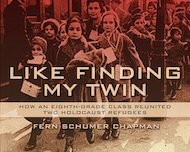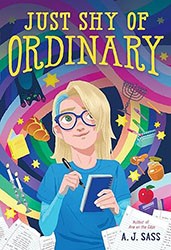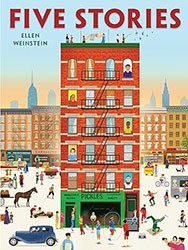Shai Epstein is a twelve-year-old Israeli who has just relocated to the United States. From Shai’s point of view, her parents’ decision to move their family was heartless. Shai’s father is a molecular biologist who has been presented with a promising career opportunity in San Diego. Shai, uprooted and lonely, dismisses his innovative work on genetically modified plants with preteen disdain: “I don’t care about Abba’s avocadoes.” In adopting the perspective of an Israeli immigrant child in America, Noa Nimrodi explores both universal themes of alienation and the specific challenges that Israelis might confront when acclimating to a new culture. Imaginative chapter titles, such as “Candy Helix, Kosher Marshmallows, and World Peace,” add momentum as the narrative unfolds.
Shai is as confused about her strange new environment as she is convinced that adult rules are arbitrary. English pronunciation is impossible, and idioms, even worse. (How can the suggestion to “break a leg” before a performance not be hostile?) Some of her neighbors have political objections to her father’s research, causing Shai to resent the decision to move even more. Her new school differs in crucial ways from her school in Israel. Nimrodi chooses to focus on the small details of Shai’s new routines rather than on broader educational disparities. Her unhappiness is unabating. Usually communal Jewish holidays become solitary experiences, and antisemitism surfaces as an ugly and unfamiliar presence.
Incidents rooted in ignorance as much as hatred are demoralizing, yet they also compel Shai to connect with her grandparents’ backgrounds in Europe and Iraq. A deliberately ambiguous ending highlights the degree to which even her parents, familiar with terrorism in Israel, are unsure how to respond to hateful events in a new environment. Nimrodi is careful to emphasize that individuals, not entire ethnicities or religions, are responsible for these actions — although readers might look for more insights into the historical context of those actions and their troubling legacy.
Friendships are a source of both joy and tension for children, and Shai’s relationships with her peers lead to emotional growth. The family of her new friend Kay-lee has undergone trauma of a different nature. The girls have more in common than Shai had anticipated, including the stable presence of a loving grandmother. Nimrodi skillfully weaves her theme of language and communication into this subplot, with moving results. When Shai’s family meets fellow Israeli expatriates and shares a Shabbat dinner with them, Shai finds nothing in common with their daughter, and is appalled by the father’s constant unfavorable comparisons of Israel to the United States. The irony that he is disloyal to Israel in a country where Jews face prejudice is not lost on Shai, and only sharpens her conviction that her own father’s career priorities — which have taken the family away from their Israeli home — are misplaced.
While there are many novels for young readers about the trauma of leaving one’s home to find a new one, Nimrodi offers a distinctive view of Israelis making this journey. Readers will empathize with Shai’s distress. Isolation, antisemitism, and the ever-present shadow of terror all play a role — but so do the disappointments and rewards of any young immigrant’s life.
Emily Schneider writes about literature, feminism, and culture for Tablet, The Forward, The Horn Book, and other publications, and writes about children’s books on her blog. She has a Ph.D. in Romance Languages and Literatures.





